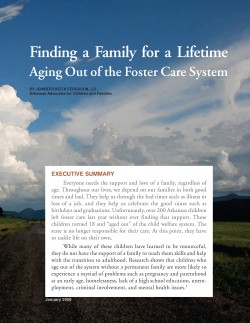
Tina and Tracy are sisters who entered the Arkansas foster care system when they were 12 and 13. Their mother was in an abusive relationship and could not care for them, and their father and stepmother did not want the girls living with them anymore. The girls were abandoned and placed in the Division of Children and Family Services’ (DCFS) custody. After being in shelters and foster homes, they were placed in the foster home of the Smith family, where they remained until they turned 18. Tina and Tracy consider the Smiths their family and have always introduced the Smiths as their mom and dad. It is the ongoing relationships both between the sisters, and with the Smiths, that are of importance.
Although Tracy, the older sister, has had a more difficult time after turning 18, both girls have benefited from the strong ties they have maintained with each other and those that they have formed with their foster parents. Tina continues to receive financial assistance through the child welfare system and is able to live in an apartment and attend a community college while working part-time. Tracy married early, but the girls have maintained close contact with each other and live in the same neighborhood. Tina continues to have a very close relationship with the Smiths and sees them several times a week. Even though the Smiths have younger biological children to care for, they have been able to help prepare the sisters for adulthood, and provide ongoing support after they turned 18.
Like Tina and Tracy, every child who leaves the foster care system at 18 should have permanent family connections. These connections can be with close or extended family members such as sisters, brothers, grandparents, aunt, uncles, cousins, or they can be with other supportive adults such as foster parents, teachers, or coaches who can serve as mentors. They should also be taught basic life skills such as how to cook meals, wash clothes, open a bank account, and pay bills. Unfortunately, many children who age out of the foster care system at 18 do not have these essential family or supportive adult connections or skills.
This issue brief will examine the demographics of the children who aged out of the Arkansas child welfare system last year, and discuss the services that are available to them before and after age 18. It will also suggest ways to help these children as they transition to adulthood. Our hope is that every child in the foster care system can have the necessary preparation for adulthood and find a permanent family before leaving the child welfare system. Like our own children, these children deserve a family for a lifetime.
